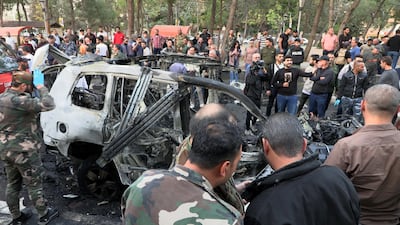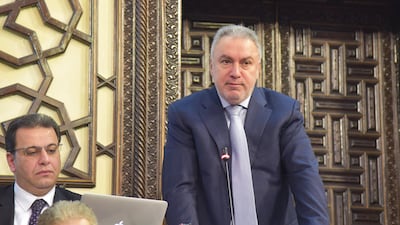Syria's legislature has revoked the membership of a business associate of Maj Gen Maher Al Assad, the brother of President Bashar Al Assad, who is considered the second-most powerful man in the country.
The move against Mohammed Hamsho, reported by Syrian official media late on Tuesday, comes as the Syrian ruling elite, and Maj Gen Al Assad in particular, come under pressure from Israel over their links with Iran. The President's younger brother controls the Fourth Mechanised Division, a praetorian army unit that Arab security sources say has played a vital role in the expansion of Hezbollah and Iran's presence in Syria.
The Parliament, called the People's Assembly, contains no opposition. It revoked Mr Hamsho’s membership because he had “lost one of the candidacy's conditions”, the state news agency Sana reported. Posts on social media groups loyal to Damascus said Mr Hamsho was removed because he possesses Turkish citizenship.
Mr Hamsho was unreachable for comment. No one answered the phone at Hamsho International, his company in Damascus, and an email to its address bounced. The opaque workings of Syria’s political system make it difficult to pinpoint why the authorities have acted against Mr Hamsho, one of Syria's richest men, and to what extent he is involved in Maj Gen Al Assad's dealings with Iran.
Israel has stepped up attacks in Syria on figures linked to Tehran since the assassination of the Hezbollah leader Hassan Nasrallah in Beirut on September 27. Two days after the air strike that killed Nasrallah, Israeli planes struck a villa in a Damascus suburb frequented by Maj Gen Al Assad. Although he is not thought to have been there at the time, the attack was seen as a signal that Syria's top brass were no longer immune.

The last time a figure as senior as Mr Hamsho fell out with the regime was when the authorities moved against the tycoon Rami Makhlouf, a maternal cousin of the President, and confiscated almost all of his assets, after he came to be seen as having become a power centre on his own. Two Syrian opposition sources said it is difficult to predict whether Mr Hamsho could end up like Mr Makhlouf, or whether stripping him of his membership of parliament signalled a rift between the President and his brother.
One of the sources, who knew Mr Hamsho as he was rising to prominence, said the businessman did not appear to have explicit approval from the presidential palace when he ran for parliament this year, and that he had spent millions of dollars to get elected. "His removal could be just a twist of the ear," the source said.
A member of a Damascene family, Mr Hamsho came to the fore in Syria's business scene in the 2000s after cultivating ties with Maj Gen Al Assad and his inner circle. This enabled him to become one of the best-connected Sunni businessmen in a country where the ruling system is dominated by the country's Alawite minority.
His businesses include telecommunications, manufacturing, construction, real estate, trading and TV production. Like Maj Gen Al Assad, Mr Hamsho, who is in his late 50s, likes fast cars – he owns a collection of American muscle cars – and horse riding.
Mr Hamsho has been under British, European and American sanctions since the Syrian authorities used deadly force to crush peaceful protests demanding the President's removal, which broke out in March 2011. By the end of the year, Syria was embroiled in civil war.
According to one of his relatives, Mr Hamsho sought to maintain ties in areas that had been taken by rebels fighting the regime, and spent lots of time in Beirut, the de facto financial centre for Syria, while maintaining his crucial connection with Maj Gen Al Assad. When announcing sanctions on Mr Hamsho in 2011, the US Treasury Department described him as one of Syria’s top businessmen, involved "in nearly every sector" of the economy.
“He is a close business associate of Maj Gen Assad, and has served as a frontman for him and a number of Assad’s businesses," the department said. British authorities described him as "benefitting from and providing support to the Syrian regime through his business interests".


